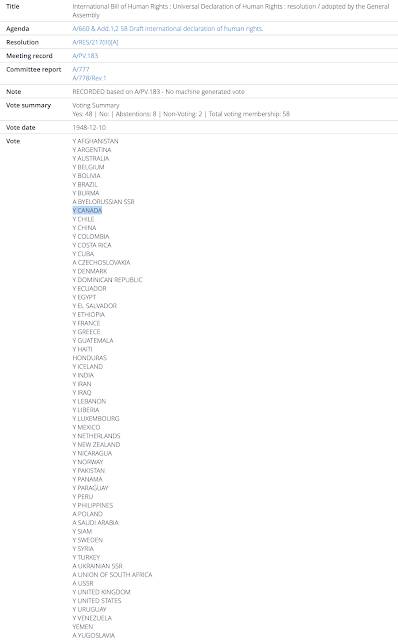The government of Ontario, Canada's largest and most populous province and the province with the most severe lockdown policies recently made changes to its Employment Standards Act or ESA in response to the COVID-19 pandemic. Let's look at the key change.
The Conservative government of right-leaning Premier Doug Ford made the following changes to the ESA which are in effect until July 3, 2021 but like all government decrees during the past year, are likely to be extended.
"Employees have the right to take unpaid, job-protected infectious disease emergency leave if they are not performing the duties of their position because of specified reasons related to a designated infectious disease. This leave is available to all employees who are covered by the Employment Standards Act.
Employers cannot threaten, fire or penalize an employee in any other way because the employee took or plans on taking an infectious disease emergency leave.
The only disease for which infectious disease emergency leave may be taken at this time is COVID-19. Although the ESA was amended to include infectious disease emergency leave on March 19, 2020, the leave entitlements for COVID-19 are retroactive to January 25, 2020 and have no end date. An employee is entitled to take this leave so long as the conditions set out below are met."
The employee may be in quarantine, voluntary or involuntary isolation or subject to a control measure that was issued by a public health official, Chief Medical Officer or Associate Chief Medical Officer among others.
Employees have the right to take unpaid leave if they are providing care or support to the following family members who require care because they have a designated infectious disease (i.e. COVID-19):
1.) the employee’s spouse (of the same or opposite sex, whether or not married)
2.)a parent, step-parent or foster parent of the employee or the employee’s spouse
3.) a child, step-child or foster child of the employee or the employee’s spouse including situations where the child was attending a school that has been closed during the pandemic
4.) a child who is under legal guardianship of the employee or the employee’s spouse
5.) a brother, step-brother, sister or step-sister of the employee
6.) a grandparent, step-grandparent, grandchild or step-grandchild of the employee or the employee’s spouse
7.) a brother-in-law, step-brother-in-law, sister-in-law or step-sister-in-law of the employee
8.) a son-in-law or daughter-in-law of the employee or the employee’s spouse
9.) an uncle or aunt of the employee or the employee’s spouse
10.) a nephew or niece of the employee or the employee’s spouse
11.) the spouse of the employee’s grandchild, uncle, aunt, nephew or niece
12.) a person who considers the employee to be like a family member, provided the prescribed conditions, if any, are met (currently there are no prescribed conditions)
13.) any individual prescribed as a family member for the purposes of this section (currently, there are no additional prescribed family members)"
Employees who avail themselves of this provision have the right to collect federal unemployment insurance benefits and other federal government financial assistance.
While all of that sounds just wonderful, let's look at the most concerning part of the changes to Ontario's Employment Standards Act which can be found in section 4 with all bolds being mine:
"The employee is under a direction given by their employer in response to the employer’s concern that the employee might expose other individuals in the workplace to a designated infectious disease. The ESA does not require employers to pay employees during that time.
Examples include where the employer
1.) is concerned that employees who have not received the COVID-19 vaccine may expose others in the workplace to COVID-19 and tells them not to come to work until they have been vaccinated.
2.) directed an employee to stay at home for a period of time if the employee has recently travelled internationally and the employer is concerned the employee may expose others in the workplace to a designated infectious disease."
This change to the ESA means that employers have the right to force their employees to stay at home without pay if they have not been vaccinated and that they must not return to the workplace until they are vaccinated. Granted, the banned employees can receive Employment Insurance during their banishment, however, EI benefits top out at $595 per week as quoted here from the Government of Canada website:
"For most people, the basic rate for calculating EI benefits is 55% of their average insurable weekly earnings, up to a maximum amount. As of January 1, 2021, the maximum yearly insurable earnings amount is $56,300. This means that you can receive a maximum amount of $595 per week."
Let's close with this quote from Article 23 of the Universal Declaration of Human Rights which was adopted on December 10, 1948:
"Everyone has the right to work, to free choice of employment, to just and favourable conditions of work and to protection against unemployment."
Canada is one of 48 nations that voted in favour of the Declaration back in 1948 as shown here:
Basically, under the changes to Ontario's employment laws, employees have no right to enter their workplace if they have not received a COVID-19 vaccine should their employer deem them a danger to other employees. There goes one of the last remaining human rights that Canadians had prior to the punitive government measures taken during the pandemic.
How long will it be before all employers require that a COVID-19 vaccination is a non-negotiable requirement for continued employment? With there being very few original thinkers among the elected ruling class, one can pretty much assure ourselves that Ontario's recent changes to its employment laws will form a template for other governments around the world.
You can publish this article on your website as long as you provide a link back to this page.


Be the first to comment